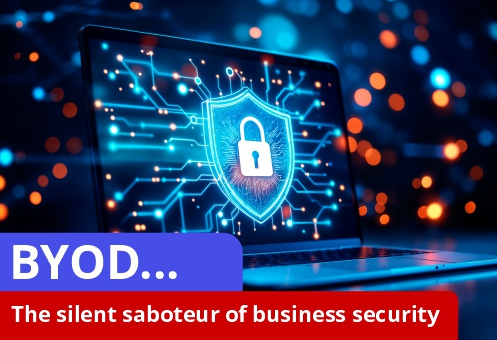Why BYOD security is a risk for businesses
BYOD: The silent saboteur of business security
In today’s fast-paced work environment, flexibility is everything, and BYOD (Bring Your Own Device) policies promise just that. But beneath the surface lies a growing security threat that many businesses underestimate. Every personal device – smartphone, tablet, or laptop can quietly expose your network to data breaches, malware, and unauthorized access. If you’re not actively managing BYOD, you’re leaving the door wide open to risk.
Don’t let convenience turn into a costly compromise; instead, take control with a BYOD strategy that works.

Image source: Freepix
7 reasons to tighten up your BYOD policy
1. Data leaks
Allowing employees to access emails and business data from personal devices increases flexibility but also introduces potential risks. Mobile devices are particularly vulnerable, with users three times more likely to click on malicious email links, which are responsible for up to 91% of cyberattacks.
Once compromised, a device can become a gateway for attackers to access sensitive information. They may read and extract business data, misuse stored credentials to reach restricted areas of your corporate network and delete or download critical files. To protect your business, it’s essential to implement strong mobile security protocols and educate users on safe digital practices.
2. Lost or stolen devices
Lost or stolen devices represent a significant security threat. T-Mobile reports that up to 41% of data breaches may be tied to misplaced laptops, tablets, or smartphones. Without proper security measures in place, such as strong authentication and encryption, these devices can provide unauthorized users with direct access to sensitive company data.
3. Jailbroken devices
Jailbreak is a term used to describe the intentional removal of restrictions on devices. The most common case of this is to bypass the limits imposed by service providers. While this may make the device more user-friendly for the individual, it poses increased risks for the organization.
According to estimates, 9% of all iPhones are jailbroken, and a similar percentage of Android devices are rooted, which can expose businesses to security threats. Moreover, few businesses have jailbreak detection mechanisms in place to safeguard their IT infrastructure.
4. Limited control
One of the challenges with BYOD is the limited control IT teams have over personal devices, which makes enforcing security policies, applying updates, and monitoring activity more difficult. To safeguard company data, businesses may want to implement tools like Mobile Device Management (MDM) or install security software.
However, these measures must be balanced with respect for employee privacy. Some users may be uncomfortable with features such as remote wiping or mandatory encryption on their devices.
5. Unsecure networks
Cybercriminals frequently target public Wi-Fi networks such as those found in airports, cafes, and hotels. When employees use these unsecured connections to access work systems, your company’s data becomes vulnerable. Hackers can intercept data transmitted over public networks, potentially gaining access to sensitive business information and internal systems.
Adding to the risk, browsers and mobile apps often cache information such as meeting notes, login credentials, and shared files in local storage. This data may also be automatically synced across personal devices through third-party accounts (e.g., Google, Apple, or Microsoft), increasing the chances of accidental exposure on less secure platforms.
6. Device incompatibility problems
The diversity of personal devices and operating systems can make implementing BYOD complex. Employees often switch between different devices, each with its own hardware, software versions, and network security protocols. This variety makes it difficult to assess security risks consistently and apply a one-size-fits-all solution.
IT teams face added challenges in providing reliable support across a wide range of platforms, which can increase complexity, resource demands, and support costs. Additionally, not all devices integrate smoothly with company systems, potentially resulting in inconsistent performance and user experiences.
7. Compliance issues
Implementing BYOD can complicate compliance with regulations such as HIPAA, GDPR, and SOX, all of which demand strict data governance, security, and auditability. When personal and business data are not properly separated or managed, the risk of legal and regulatory violations increases.
Allowing employees to store corporate information on personal devices heightens the potential for data exposure. If a device is lost or stolen and sensitive data isn’t adequately protected, the organization may face serious compliance breaches and must take immediate, often costly, remediation steps to prevent unauthorized access.
Safely unlock the full potential of BYOD
With a well-defined BYOD policy and a strong security framework, your business can confidently embrace the flexibility and productivity that come with using personal devices while minimising risks. You can protect sensitive information and ensure regulatory compliance by proactively managing how your business data is accessed.
Develop a BYOD policy that empowers and protects
A BYOD policy with clear practical guidelines for using personal devices responsibly and securely will help you maintain control over data security without compromising user experience. Consider including the following elements in your BYOD policy:
- App whitelisting: Identify and approve specific applications for use, such as email clients, VPNs, and cloud storage services.
- App restrictions: Clearly state whether apps with questionable or weak security should be blocked on devices that access company data.
- Device & OS support: Define which types of devices and operating systems are permitted for use.
- Minimum security standards: Require all approved devices to meet baseline security requirements before accessing company systems.
- System updates: Include a mandate that all devices have the latest operating system updates and security patches installed.
Prevention is better than cure
Can your business afford security breaches and downtime? With real-time monitoring and proactive issue resolution, our audiovisual / IT support and maintenance service ensures all your devices stay connected, updated, and operational 24-7.
Copyright © 2025 Visually Connected with Display Manager. All Rights Reserved.
